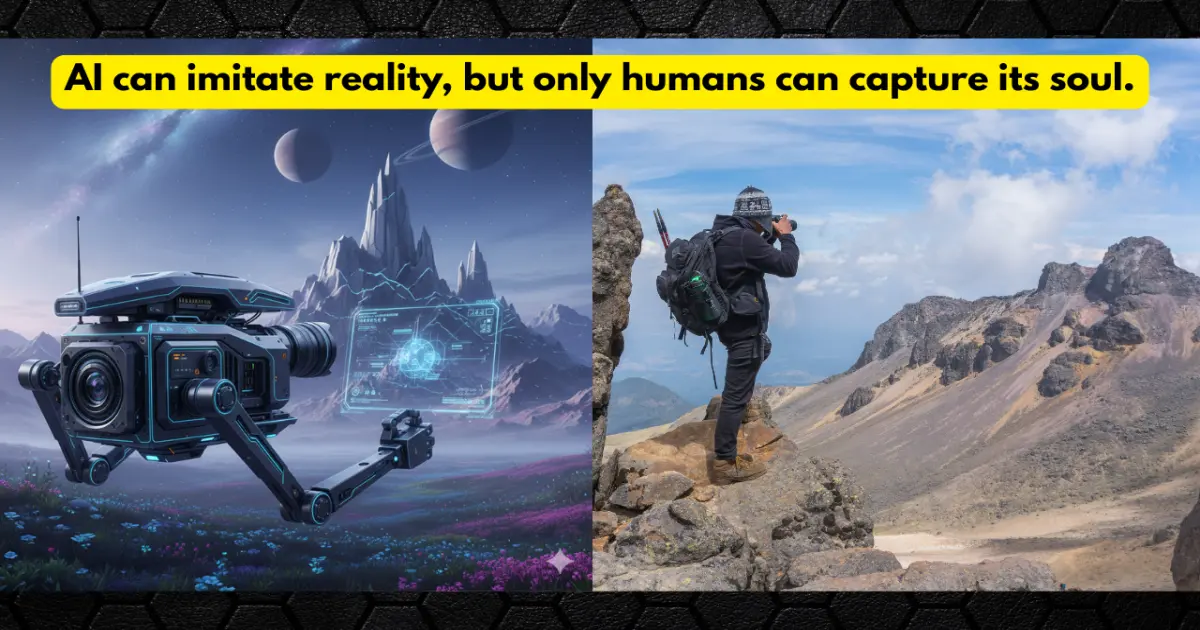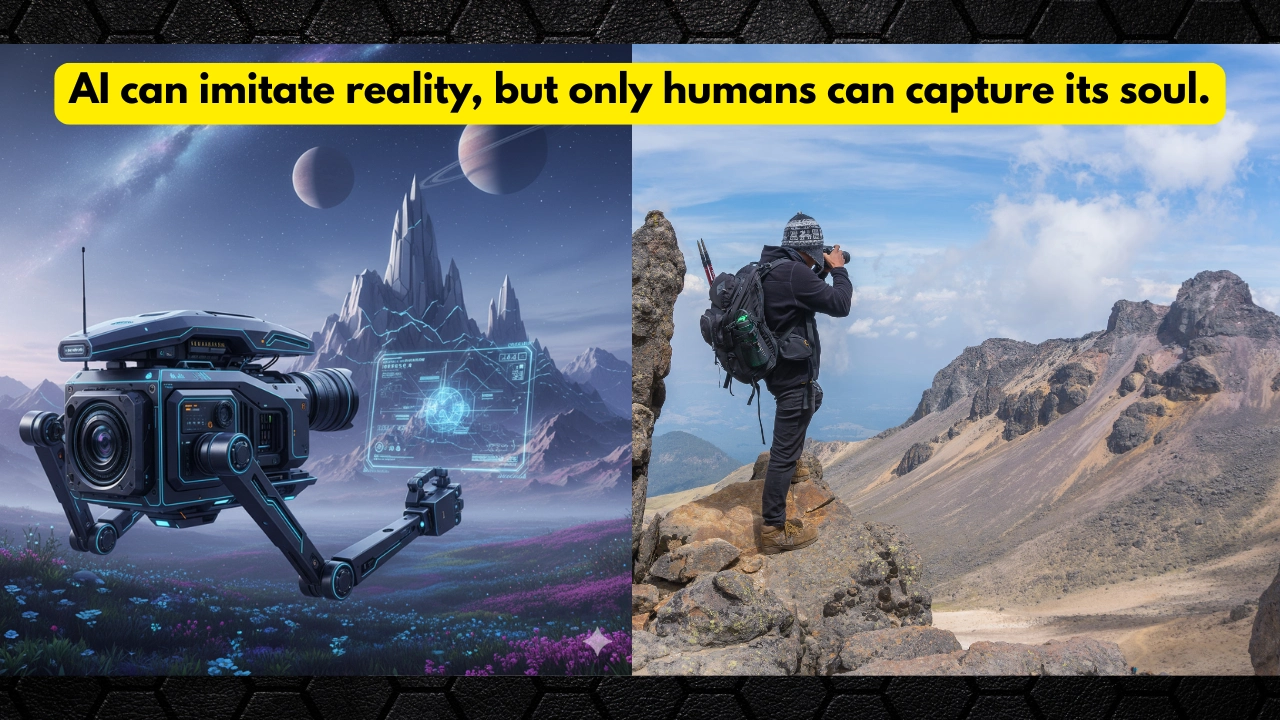The Rise of Ethical Imagery: How Authentic Photos Will Beat AI in the Long Run
Discover why authentic photos and ethical marketing will outshine AI visuals. Explore the future of authenticity vs. AI in digital storytelling.
A php Developer
In today’s digital age, visuals speak louder than words. From websites to social media campaigns, images define how a brand is perceived. But as AI-generated visuals continue to dominate our feeds, a new conversation is emerging — one centered around authenticity, ethics, and trust.
While artificial intelligence can create stunning, picture-perfect images in seconds, consumers are beginning to crave something deeper — something real. This marks the rise of ethical imagery, where authentic photos and genuine moments outshine algorithmic perfection.
What Is Ethical Imagery?
Ethical imagery refers to visuals that are:
-
Captured from real people, real emotions, and real experiences,
-
Used with consent and transparency, and
-
Aimed at building trust and honesty in digital storytelling.
In simple terms, ethical imagery values truth over trend. It focuses on authentic content that connects emotionally — not just visually.
The AI Visual Revolution — A Double-Edged Sword
AI tools like Midjourney, DALL·E, and Adobe Firefly have revolutionized content creation. Marketers can now produce high-quality visuals faster and cheaper than ever before.
However, this revolution brings a few major concerns:
| Concern | Description |
|---|---|
| Misinformation | AI images can easily create false realities — deepfakes, fake ads, or manipulated political visuals. |
| Loss of Human Touch | AI lacks emotional context — it can replicate, but not feel. |
| Creativity Crisis | As AI-generated content floods the web, originality and artistic authenticity may decline. |
| Ethical Uncertainty | Questions arise around ownership, consent, and bias in AI datasets. |
So while AI enhances creativity, it also challenges ethical marketing principles that are fundamental to brand credibility.
Authenticity: The New Currency of Trust
In an era of digital overload, audiences have become skeptical. They can spot staged or AI-generated content in seconds. Studies show that consumers are:
-
2.4x more likely to trust brands that use real people in their campaigns.
-
68% more engaged with behind-the-scenes or user-generated images.
Brands that value authentic content build stronger, longer-lasting relationships with their audiences.
Why Authentic Photos Still Matter
-
Emotional Connection
A candid smile or genuine story resonates more than a polished AI portrait. Humans crave emotional depth — something AI cannot truly replicate. -
Cultural Relevance
Real photos capture diversity, imperfections, and context — aspects that define society and culture. -
Transparency and Trust
Ethical marketing thrives on honesty. Using real visuals demonstrates integrity and respect for your audience. -
Brand Differentiation
When every brand uses AI visuals, authenticity becomes your competitive edge.
AI vs. Human Creativity: Who Wins?
| Aspect | AI-Generated Images | Human Photography |
|---|---|---|
| Speed | Instant results | Time-consuming |
| Cost | Low | Moderate to high |
| Emotion | Simulated | Genuine |
| Ethics | Often unclear | Transparent |
| Creativity | Pattern-based | Experience-based |
AI excels in speed and scalability, but human creativity thrives on emotion, empathy, and imperfection — qualities that define powerful storytelling.
Ethical Marketing in the Age of AI
Ethical marketing goes beyond selling. It’s about aligning brand values with responsible content practices. Here’s how businesses can embrace ethical imagery in the AI era:
✅ 1. Use Real Faces and Stories
Feature real customers, employees, or communities instead of AI models.
Example: Campaigns like #RealBeauty by Dove gained global trust through authentic imagery.
✅ 2. Disclose AI Usage
If you use AI-generated visuals, be transparent. Label them clearly — honesty strengthens brand reputation.
✅ 3. Promote Diversity and Inclusion
Avoid biased or stereotypical AI imagery. Represent real-world diversity through genuine photography.
✅ 4. Support Human Creators
Collaborate with photographers, artists, and storytellers. Celebrate human creativity instead of replacing it.
✅ 5. Audit Your Visual Ethics
Review your image library regularly. Ensure all visuals align with your brand’s authentic content policy.
The Future: A Balance Between AI and Authenticity
The future isn’t AI vs. humans — it’s AI + humans. The most successful brands will merge both worlds:
-
Use AI for productivity and design efficiency.
-
Use human photography for emotion, credibility, and connection.
The winning formula is tech-assisted storytelling — where AI helps enhance human creativity, not replace it.
Conclusion: Authenticity Will Always Win
In the long run, authentic photos will outshine AI-generated perfection. People don’t just want beautiful images — they want believable stories.
As we move toward a hyper-digital future, brands that stay rooted in truth, empathy, and ethics will lead the next chapter of marketing.
Final Thought
“AI can imitate reality, but only humans can capture its soul.”
So, as marketers, creators, and storytellers, let’s champion ethical imagery — because in the race between pixels and people, authenticity will always win.

ユーザーの声
Support ImgSmaller
Found it useful? Add a link to help others discover privacy‑friendly image compression.
